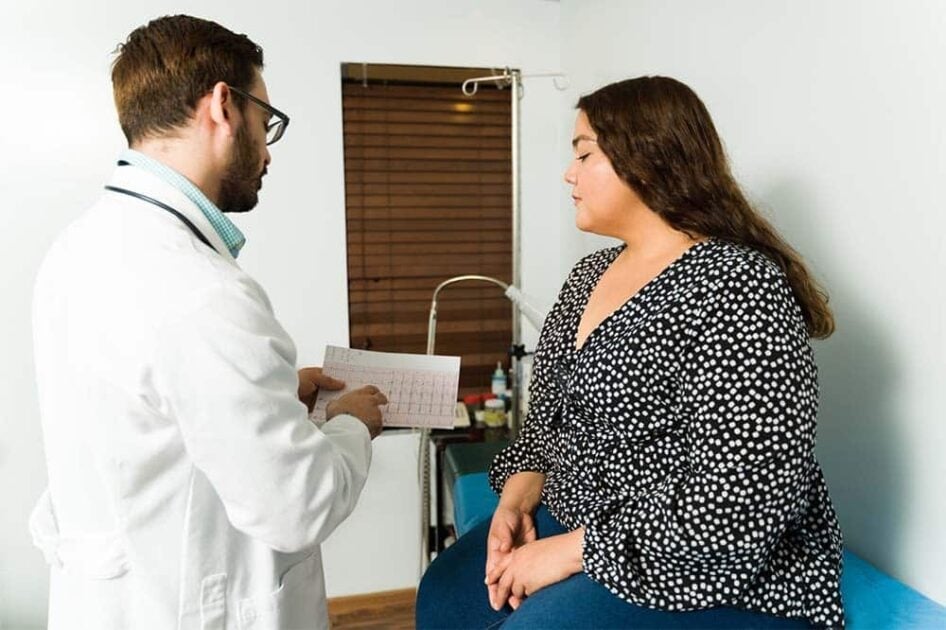What are the signs of an STI?
Getting regular STI check-ups is one of the best ways to look after your sexual health.

Sexually Transmitted Infections (STIs) are infections that are passed from one person to another through unprotected genital-to-genital contact, exchange of bodily fluids or skin-to-skin contact. There are at least 25 different types of STIs and many different signs of an STI. An STI can be a bacterial infection such as chlamydia or gonorrhoea or a viral infection such as genital herpes or HIV.
Parasites such as public lice are also a form of STI. All STIs are serious, but most are entirely treatable. They can, however, cause long-term problems if they aren’t diagnosed and treated properly. The most common STIs in Ireland are chlamydia and genital warts. Some common signs of an STI are unusual discharge, pain when peeing and pain during sex.
If you are having sex you should have regular check-ups for STIs, as it is important to look after yourself and those you have sex with. If you’ve had unprotected sex (vaginal, anal or oral) go for a check-up immediately.
Getting tested is the only way to know for sure if you have an STI and there are clinics all over Ireland where you can get tested for free.
How to get tested for an STI:
- Home testing kits are available for free from the HSE
- Your GP may offer a testing service for a fee, or for free if you have a medical card
- There are also private sexual health services where you can get tested for a fee
- Student GP clinics also offer STI testing at reduced rates
What are the signs of an STI?
There are many different symptoms you can experience if you have an STI. However, many people experience no symptoms at all, so it’s important to get checked if you have had unprotected sex.
Some signs of an STI could include:
- An unusual discharge/ liquid or smell from your vagina, penis or bum
- Blisters, boils, lumps, swelling or itching in or around your vagina, penis or bum
- Burning or painful feeling when you pee
- Pain during sex
- Bleeding in between periods or bleeding following sex
What are the signs of Syphilis?
Syphilis is a bacterial STI that enters your body through broken skin in the areas surrounding the genitals, such as the vulva, vagina, penis or anus (bum).
The signs of syphilis can include:
- Painless ulcer (similar to a cold sore) in the genital, anal or mouth area (these will usually appear around three weeks after exposure)
- Red spotty rash, typically on the palms of your hands and the soles of your feet, but it may also appear elsewhere on your body (between six weeks and six months after exposure)
Other symptoms of syphilis include:
- Fever
- Swollen glands
- Hair loss (temporary)
- A sore throat
- Headaches
- Muscle aches
- Tiredness
- Weight loss
What are the signs of Chlamydia?
Most people with chlamydia won’t experience any symptoms and this is one of the reasons it is important to go for regular STI check-ups if sexually active. If symptoms do occur, they are more likely to develop between one and 28 days after sexual contact with someone who has the infection. If you have symptoms, how they show will depend on where the infection is.
Chlamydia symptoms in men
If you have a penis and testicles you might have symptoms such as:
- Discharge from the tip of the penis
- Pain or discomfort passing urine
- Bowel symptoms such as diarrhoea, pain, mucus discharge or bleeding from your anus
- Pain and swelling in one or both testicles
Chlamydia symptoms in women
If you have a vagina and womb you might have symptoms such as:
- Bleeding after sex
- Bleeding between periods
- Change in your normal vaginal discharge
- Pain passing urine
- Pain in your abdomen (tummy)
What are the signs of Gonorrhoea?
Gonorrhoea is a curable bacterial infection caused by the bacteria Neisseria Gonorrhoeae. Gonorrhoea is the second most common bacterial STI in Ireland. The groups most commonly affected by gonorrhoea are those under the age of 25 and gay and bi men and men who have sex with men.
Symptoms in men
If you have a penis and testicles you might have symptoms such as:
- Discharge or liquid from the tip of the penis
- Burning pain when passing urine
- 1 in 10 men and people with penises have no symptoms of gonorrhoea. Infections in the throat or rectum (back passage) usually go unnoticed. Because of this, it is important to have regular STI check-ups if you are sexually active. The symptoms of gonorrhoea usually appear between 1 to 14 days after coming into contact with the infection.
Gonorrhoea symptoms in women
If you have a vagina, you might not have symptoms at all.
Gonorrhoea rarely shows symptoms in people who have vaginas – most (70%) have no symptoms. Although you may have no symptoms you can still pass gonorrhoea on to others if you have unprotected sex. Going for regular STI check-ups is the best way to protect your health and the health of those you have sex with.
What are the signs of Shigella?
Shigella is a bacteria that can cause severe stomach upset. The shigella bug is passed on through infected faeces (poo). This can happen through contaminated food or sexual activity. Symptoms often develop around one to three days after (sexual) contact and last up to a week.
Symptoms may include:
- Diarrhoea – this can be severe and last for a few days
- Feeling sick (nausea) and vomiting
- Stomach cramps
- Feeling feverish
- In serious cases, diarrhoea can contain blood and/or mucus
What are the signs of Lymphogranuloma venereum?
Lymphogranuloma Venereum, or LGV, is a type of chlamydia. LGV is mainly diagnosed in gay and bi men and men who have sex with men (MSM). Symptoms of LV often develop around 3 days to 3 weeks after sexual contact. In those who frequently have anal sex, it is mostly seen in the rectum (back passage).
Symptoms include:
- Bleeding, pain or pus from the back passage (anus). You may feel like you need to open your bowels all the time
- Constipation or diarrhoea
- Painless blisters (sores) on the penis, discharge from the penis, swelling in the groin area
- Sore throat, swollen glands in the neck
What are the signs of Chancroid
Chancroid is a type of bacterial infection that is spread through direct skin-to-skin contact. It is a rarer form of an STI but is easily treatable. The symptoms of Chancroid can vary depending on sex.
They can include:
- Small red bumps, most frequently on the head and shaft of the penis and on the scrotum
- Similar small red bumps, commonly on the labia (the folds of skin around the genitals), around the anus, or on the thighs
- Those small red bumps can turn into ulcers or open sores in a matter of days
The ulcers:
- Range in size and are soft to the touch
- Can be grey or yellowish in the middle
- Have sharply defined borders
- May be painful
- May bleed easily and/or release a contagious fluid.
The most common symptoms for women are pain during sex and while peeing, although these symptoms are present in men as well. The lymph nodes in the groin may also become tender or swollen.
What are the signs of Non-Specific Urethritis?
Non-specific Urethritis (NSU) is an inflammation of the urethra, which mainly occurs in men or people with a penis. If left untreated it may cause infertility.
NSU is transmitted through sexual contact with an infected person via vaginal and anal sex and skin-to-skin contact. It can also be passed on through the sharing of sex toys.
Like a lot of STIs, some people may present no symptoms. Others may have some symptoms, which include;
- Burning sensation when peeing
- Redness or swelling at the top of the penis
- If it spreads to the testicles and prostate gland, it can cause pain or swelling
- If left untreated it can affect male fertility
What are the signs of Pelvic Inflammatory Disease?
Pelvic inflammatory disease (PID) is an infection of the womb, fallopian tubes and ovaries. It is usually a result of chlamydia and gonorrhoea in people with a cervix, but may also be caused by bacterial vaginosis and other infections.
The symptoms of PID can include:
- Pain passing urine (pee)
- Pain in the abdomen (tummy or belly area)
- Pain during or after sex
- Raised temperature
- Nausea or vomiting
- Bleeding after sex
- Bleeding between periods
- Change in your normal vaginal discharge
What are the signs of Genital herpes?
Genital herpes is a viral infection caused by the herpes simplex virus (HSV). Herpes is common in Ireland and is mostly diagnosed in young women and people with vaginas.
Many people with the herpes virus do not experience any symptoms when they are first infected and, as a result, do not know that they have it. If you do get symptoms, your first outbreak will usually be the most severe. It usually takes between two and 12 days after contact with the virus for the first symptoms of genital herpes to appear.
Symptoms are multiple spots or red bumps around the genital area. These can be very painful. In time, these swellings can break open and form sores or ulcers which gradually crust over, forming new skin as they heal. As well as having painful ulcers or blisters, you may have swollen glands in your groin, flu-like symptoms and a feeling of being unwell. You may also feel pain when passing urine. Sometimes people cannot pass urine and may need to come to a healthcare provider for review – very occasionally people need a catheter to relieve themselves until the symptoms improve.
What are the signs of Genital warts?
Genital warts are warts in the genital area (penis, testicles, vulva, anus and upper legs) caused by a virus called the Human Papilloma Virus (HPV). Some types of HPV may lead to cancer, however, the types of HPV that cause genital warts do not cause cancer. Genital warts are often flesh-coloured lumps or bumps on the skin, anywhere in the genital or anal area. They may appear weeks to months after you come into contact with the HPV virus. If you think you have any signs of an STI it is important to not have sex with anyone else and get tested as soon as possible.
What are the signs of Hepatitis B?
Hepatitis B is a viral infection that infects the liver. Hepatitis B is a major cause of serious liver diseases such as cirrhosis and liver cancer and affects millions of people worldwide. In most people, a full course of vaccination prevents infection.
Many people with hepatitis B have no symptoms, many do not even realise that they are infected and most people who are infected have no symptoms for many years.
Some people may have symptoms when they first become infected, which can last for several weeks.
These may include:
- Flu-like symptoms
- Feeling sick or vomiting
- Diarrhoea
- Loss of appetite
- Yellowing of the skin and eyes (jaundice)
- Dark urine (pee)
- Pale faeces (poo)
- Itchy skin
In a small number of people, the initial infection can be severe and they can develop liver failure, which can lead to death, but this is rare.
What are the signs of HIV?
HIV (Human Immunodeficiency Virus) is a virus that attacks and weakens the body’s immune system (the body’s disease-fighting system). HIV makes it difficult for your body to fight against infections and cancers that it would normally be able to fight off.
It takes seven to ten years for many HIV-positive people to show symptoms of the illness. Early symptoms can include swollen lymph glands in the throat, armpits and groin, fever, headaches, tiredness and muscle pain. If you are HIV positive you might be healthy for years, but can still pass the virus to other people. If you think you have any signs of an STI it is important to get tested.
People living with HIV can take medication that will keep them healthy and prevents HIV from being passed on to their sexual partners. The medicine works by reducing a person’s viral load to an undetectable amount.
Undetectable means that the amount of HIV in the blood is so low that it was not picked up by the test. The person is still HIV-positive and must continue to take their medication but the treatment is so effective that they cannot pass on HIV to another person through sex. This breakthrough in HIV medicine is known as Undetectable equals Untransmittable or U=U.
What are the signs of M-pox?
It usually takes between 5 and 21 days for the first symptoms to appear.
The first symptoms of M-pox (previously called Monkeypox) may include some of the following symptoms:
- Rectal pain and bleeding (proctitis)
- A high temperature (38 degrees Celsius or higher)
- A headache
- Muscle aches
- Backache
- Swollen glands
- Shivering (chills)
- Exhaustion
A rash usually appears 1 to 5 days after the first symptoms, although sometimes the rash can be the only symptom. The rash often begins on the face and then spreads to other parts of the body. If M-pox has been spread through sexual contact, the rash can first appear around the genital and anal area.
What are the signs of Molluscum contagiosum
Molluscum contagiosum is a viral skin infection. It is not serious or dangerous, but it can cause growths to form and can appear in the genital area when spread by sexual contact. It is not considered a sexually transmitted infection (STI).
Symptoms usually appear in the first three months after infection. This includes:
- Small painless pearly growths which may be very itchy
- Each growth will generally last for 2-3 months if left untreated
What are the signs of Pubic lice?
Pubic lice, also known as crabs, are a common sexually transmitted infection (STI), passed through close body contact. They can cause a lot of irritation and itching and are generally very uncomfortable. Fortunately, it is possible to treat pubic lice effectively. If you think you might have public lice it is important to go for an STI check-up, where you can get the best advice on treatment.
Symptoms from pubic lice can include:
- Itchy red spots caused by an allergic reaction to the saliva and droppings of the lice – Itching can take 1-3 weeks to develop and is usually worse at night
- Finding the small insects on your body
- Inflammation of the area from scratching
- Black or brown powder on your skin or underwear (louse droppings)
- Blue spots or specks of blood caused by bites
- Nits (empty eggshells) attached to the base of the hairs
What are the signs of Trichomoniasis?
Trichomoniasis, also known as TV, is a common infection caused by a small parasite (Trichomonas vaginalis) that irritates the urinary tract and vagina. It can cause urinary tract and vaginal infections and can also increase your risk of getting other sexually transmitted infections (STIs).
Around 70% of people who have TV don’t have any symptoms and men, or those with a penis, aren’t very likely to notice them at all.
Symptoms in women (or people with a vagina):
- Abnormal vaginal discharge
- Vaginal discomfort
- Burning or stinging sensation when you pass urine
- Offensive smell
- Possibly no symptoms at all
Symptoms in men (or people with a penis):
- Discharge from penis
- A rash on the penis
- It’s rare but a burning or stinging sensation when you pass urine
- Possibly no symptoms at all
What are the signs of Epididymitis?
Epididymitis or Epidiymo-orchitis is a condition that affects people with penises. Symptoms include pain and swelling inside the scrotum (balls).
The symptoms of Epididymitis can include:
- Pain and swelling in one or sometimes both of your testicles that comes on suddenly
- Discharge from the tip of the penis
- Pain on passing urine.
- Feeling generally unwell with a fever
What are the signs of Granuloma Inguinale
Granuloma Inguinale is a sexually transmitted infection (STI). It is not common in Ireland.
Symptoms of Granuloma Inguinale can include:
- Small painless lumps on the genitals
- Occasionally, small painless lumps around the anus or mouth
- Deeper ulcers around the genitals, anus, thighs and belly – these ulcers may have a foul smell
If you are experiencing any of these symptoms, you should go to your GP or sexual health clinic.
How to prevent getting an STI
There are many great options to help protect your sexual health, but none of them are 100% effective. Even if you use condoms every time you have penetrative sex, you are still at risk of getting genital warts and herpes, as these can be passed through skin-to-skin contact. Going for an STI check or taking a home STI testing kit with a partner before having sex can be a great way of protecting yourself and those you have sex with against STIs and HIV. However, not all STI checks check for all STIs, so it is important to speak to your healthcare provider and ask them what is being tested for as part of your screening.
Discussing with your sexual partners the type of contraception or protection options available to you, and agreeing on a type that works for everyone involved can help to reduce the risk of unwanted pregnancy, STIs and HIV. Looking out for signs of an STI such as sores or symptoms on a partner’s genitals before having sex with them, can help to identify STIs that they may not be aware of. If you do see any signs of an STI, do not have sex with them until you know for certain it is safe to do so. Asking someone about their sexual health history is the responsible thing to do before having sex, and you shouldn’t feel insulted if someone asks you about yours.
Looking after your mental health after an STI diagnosis
If you are diagnosed with an STI, you might feel a mixture of emotions. Unfortunately, there is still stigma in our society surrounding STIs that can cause some people to feel shame about having one. However, like any other healthcare diagnosis, you are not to blame for your STI and have not done anything “wrong”. Being diagnosed with an STI can have a negative impact on your mental health and well-being and if you don’t feel comfortable telling friends or family about it, you might feel isolated and alone. If you have found out you have an STI and you’re finding it difficult to cope, there are things you can do to support your mental health.
- Remember that STIs are common and lots of people have one at some point in their life, even if you don’t hear them talked about
- Take time out to do something you enjoy and practice self-care
- Reach out for mental health support. If you don’t feel comfortable talking to a friend or family member, our 24/7 anonymous text service, 50808, can help
- Be patient with yourself and allow yourself to feel your emotions. It’s ok to be upset when you find out you need healthcare treatment. It’s important to take the time you need to adjust
Feeling overwhelmed and want to talk to someone?
- Get anonymous support 24/7 with our text message support service
- Connect with a trained volunteer who will listen to you, and help you to move forward feeling better
- Whatsapp us now or free-text SPUNOUT to 50808 to begin.
- Find out more about our text message support service
If you are a customer of the 48 or An Post network or cannot get through using the ‘50808’ short code please text HELLO to 086 1800 280 (standard message rates may apply). Some smaller networks do not support short codes like ‘50808’.






